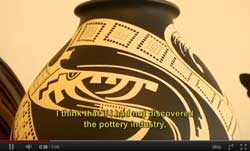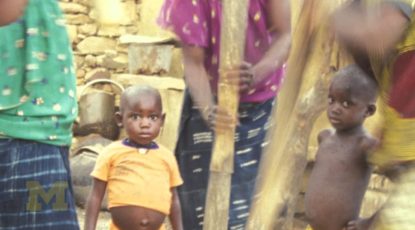International
-
Preacher's kid
How a professor’s childhood faith led him to become an innovative scientist.
-
Shaping beauty from the desert
The inspiring story of an unlikely friendship between an American anthropologist and a Mexican artist who rediscovered an ancient way to make pottery. University of Michigan graduate Scott Petersen’s remarkable documentary describes how the men and the art saved a whole town from extinction.
-
9/11 + 10
On the 10-year anniversary of the Sept. 11 attacks, U-M students, alums and faculty talk about how the world has changed.
- The eyewitness: “Suddenly, I knew I must run.”
- The Marine: “I wanted to be in combat.”
- The terrorism expert: “Today, al-Qaeda itself is dead.”
- The researcher: “The wars shrank the defense research horizon dramatically.”
- The student: “My teacher returned moments later, visibly shaken.”
- The lost: 18 Michigan alums were killed on 9/11.
-
9/11 + 10: The Marine
Marine second-lieutenant Patrick Callahan serves in the University of Michigan’s Naval ROTC program. Michigan Today asked Lt. Callahan to describe the impact of the 9/11 attacks on his military experience.
-
9/11 + 10: The eyewitness
Steve Fetter was working in the financial district of Manhattan on 9/11. What he saw that day transformed his life completely. Here is a pair of excerpts from his play about the day and its aftermath, “A Blue Sky Unlike Any Other.”
-
9/11 + 10: The researcher
Stephen Forrest is Vice President for Research at the University of Michigan. U-M receives millions in research funding from the federal government, and some of that is for defense-related research. Michigan Today asked Forrest to describe some of the ways 9/11 and its aftermath have affected research in the US and at U-M.
-
9/11 + 10: The student
Nell Gable was just 11 years old on 9/11/2001, but she remembers the day vividly, and continues to live today with the uncertainty it caused.
-
9/11 + 10: The terrorism expert
Scott Atran is a world-renowned expert on terrorism and terrorists. His research and his book “Talking to the Enemy: Faith, Brotherhood, and the (Un)Making of Terrorists” derive from years in the field interviewing terrorists from around the globe. Michigan Today asked for his insights into the status of terrorism ten years after 9/11.
-
Actually, it doesn't take a village
“In the African villages that I study in Mali, children fare as well in nuclear families as they do in extended families,” says U-M professor Beverly Strassmann.




